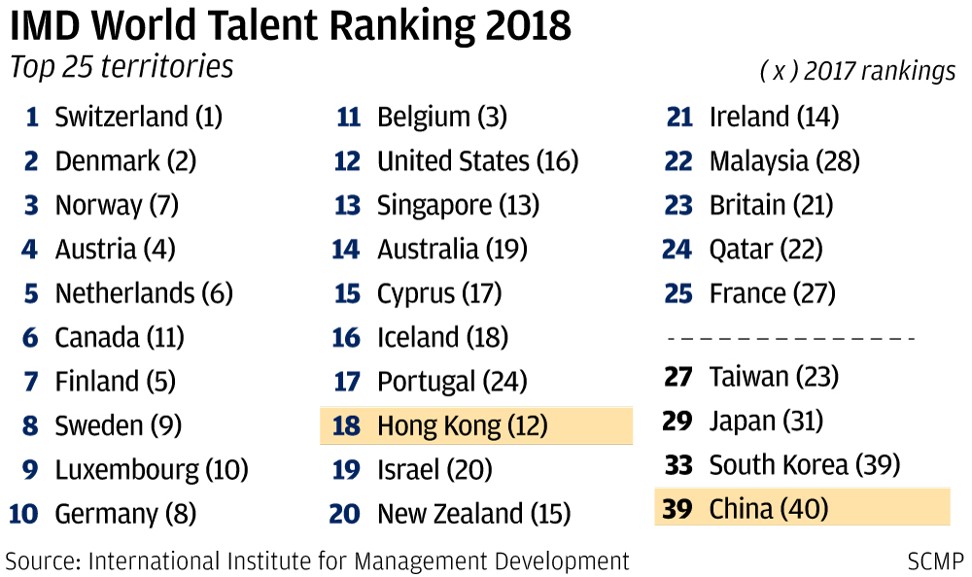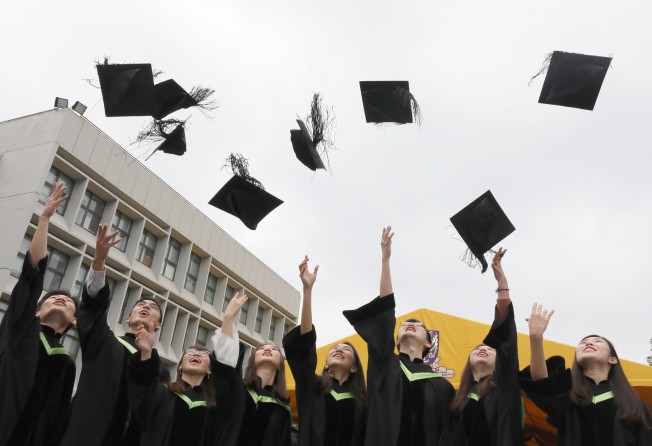
Hong Kong falls six places to 18th in global talent ranking, trailing Singapore
- Report by Switzerland-based International Institute for Management Development says city is lagging in public investment in education

Hong Kong has fallen six places to rank 18th in attracting and fostering talent, partly due to concerns over public investment in education, according to a global study by the Switzerland-based International Institute for Management Development.
In the business school’s IMD World Talent Ranking, Singapore came first among Asian economies at 13th place overall, while China placed 39th. Switzerland topped the class, followed by Denmark and Norway.
The report, unveiled on Tuesday, evaluated the capability of 63 territories in developing, attracting and retaining talent. The results were based on factors such as investment and development, appeal, as well as readiness.
Researchers measured the resources committed to cultivating home-grown human capital, the extent to which a place attracted foreign talent and retained professionals from the local talent pool, as well as the quality of skills and competencies available in an area.
Hong Kong, which ranked 12th overall last year, slipped to a lower position in all three areas.
In terms of investment in and development of home-grown talent, the city fell seven spots from last year to 31st. When it came to tapping into the overseas talent pool, Hong Kong placed 14th, compared with 11th last year. It also fell from sixth to ninth place for talent readiness.
“[Hong Kong’s] strengths are in appealing to overseas highly skilled professionals, which enables it to sustain its top-tier talent pool,” the report said. “However, its gradual decline is worrying for the future, especially considering that it lags behind in terms of public investments in education.”
The city’s total public expenditure on education was reported to be 3.3 per cent of its gross domestic product, coming in 56th among the 63 places in the study. Top-ranked Switzerland spent 5.1 per cent of its GDP on education. Singapore spent a mere 2.9 per cent, ranking 60th in that category.
For expenditure on education per student, Hong Kong came in 33rd while finishing 36th in the pupil-teacher ratio for secondary schools. The city has 12.96 pupils to one teacher at this level, while Switzerland’s was 11.68 and Singapore had 12.2.
This was despite concerted government efforts to promote education. After offering a HK$5 billion (US$637.6 million) boost to annual education spending in July last year, the government committed an extra HK$2 billion in this year’s budget announcement and another HK$1.3 billion in the latest policy address released last month.
Chief Executive Carrie Lam Cheng Yuet-ngor, speaking before the weekly Executive Council meeting on Tuesday morning, said she was not too worried about the drop in rankings.
“I have yet to find out the so-called cut-off date for the information [used in the report],” she said. “It might capture information from a year ago, so it would not have reflected the extensive investment we have made in education in this term of government.”
Spending in education is the best investment the government can make as it would nurture talent to meet the needs of the economy in the future
Lam said her administration had put in an additional HK$8.3 billion in recurrent expenditure covering preschool, primary, secondary to tertiary education services, an increase of almost 10 per cent.
“Spending on education is the best investment the government can make as it would nurture talent to meet the needs of the economy in the future,” she said, pledging that authorities would continue to invest in the sector and review existing policies.
Education sector lawmaker Ip Kin-yuen said the drop in overall ranking was significant and proved that the government’s latest increase in expenditure was far from enough. On the secondary school pupil-teacher ratio, he called for less pupils to each teacher.
Charles Mok, IT sector lawmaker, argued that the government had overlooked specific needs of developing a new economy and urged that beyond just boosting education infrastructure, authorities should also enhance on-the-job training.
Since August this year, the government has launched two schemes to help companies hire PhD holders and train staff in efforts to recruit and nurture technology talent, but experts said more work was needed.
“As a top technology talent, salary is not the most significant factor, but rather, the complementary system such as whether there are famous and creative companies in the city,” Alexa Chow Yee-ping, managing director of AMAC Human Resources Consultants, said.
“Hong Kong is lagging behind in terms of technology development.”
According to official figures, between 2008 and 2017, three other government programmes have brought in more than 147,000 workers from mainland China and foreign countries into the city.
Meanwhile, Malaysia climbed six places to 22nd in the ranking, becoming the third most talent-competitive territory in Asia. Taiwan and Japan came 27th and 29th respectively, while South Korea secured 33rd place.
China’s 39th spot was a result of its difficulties in attracting foreign skilled workers.
“[This] paired with a level of public expenditure in education that remains below the average of other advanced economies,” the study stated.